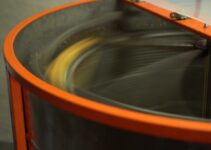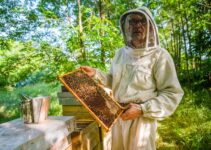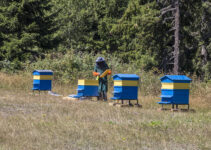Kentucky is known for its bluegrass and its bourbon, but beekeeping is another popular activity in this state. The beekeeping laws in Kentucky at a state level are not complicated, but each local region has by-laws and ordinances which must be observed.
The Kentucky Department of Agriculture appoints a State Apiarist to implement and maintain laws in the state for the import and export of bees and the control and eradication of bee pests and diseases. Local ordinances govern the keeping of bees in city limits for public safety and nuisance issues.
The State Apiarist is the authority on beekeeping laws and regulations in Kentucky, which primarily focus on disease and pest control. Each territory governs public safety and beekeeping logistics with local regulations to protect the general public.
Laws For Keeping Bees In Kentucky
The climate in Kentucky is mostly classed as humid subtropical, with hot summers and generally mild winters, making it a great climate for beekeeping.
There are pollination opportunities for beekeepers in Kentucky, as well as honey production from the diversity of farming activities in the state.
As a busy state for beekeeping as an industry, there are some laws that govern the keeping of bees in Kentucky. The state has basic laws, mostly regarding the import and exporting of bees from the state and the prevention of the spread of bee-related diseases and pests.
Kentucky has a State Apiarist appointed who is responsible for identifying, eradicating, and controlling honey bee pests and diseases.
The State Apiarist is responsible for performing inspections and issuing relevant certificates to the beekeeping industry in Kentucky.
Educating the non-beekeeping community in the state on the benefits of bees and pollination services is also part of the mandate of the office of the State Apiarist.
The state Apiarist, currently Dr. Tammy Potter, is part of the Kentucky Department of Agriculture and works closely with the farming community in the state.
General Laws For Beekeeping In Kentucky
Most of the state laws for keeping bees in Kentucky are related to protecting the beekeeping and pollination industry and in support of the general agriculture industry of the region.
All bees being imported into Kentucky must be accompanied by a certificate of health from the state where the bees originated. The imported bees must be inspected by the State Apiarist and certified disease and pest free when they enter Kentucky.
Likewise, bees and bee hives originating in Kentucky can only be exported from the state with a certificate of health issues by the State Apiarist.
One of the primary and all-encompassing laws regarding beekeeping in Kentucky is that bees must not be kept in a manner whereby they become a nuisance or a danger to other people or businesses.
The State Apiarist in Kentucky is also available to give advice to the beekeeping community by way of giving talks at bee club and bee association meetings around the state.
No Liability Immunity Law For Kentucky Beekeepers
One interesting nuance of beekeeping in Kentucky is that the state makes no provision for liability exemption for beekeepers, as is the norm in many other states.
Most states take the view that there is no way to prove that the bee or bees that stung a person are from the beekeeper’s colony. The bee could be a forager from a wild, non-managed colony rather than the beekeeper’s colony.
However, if a person is stung due to negligent or unsafe beekeeping practices by the beekeeper, the beekeeper can be found liable for public injuries.
Kentucky has no such exemption law for beekeepers, making it difficult for people to keep bees on their property. Some insurance companies will not offer homeowners insurance if you keep bees on the property.
For this reason, many local ordinances regarding beekeeping in urban and suburban areas require a beekeeper to take out a separate liability insurance policy for beekeeping.
Local Beekeeping Ordinances In Kentucky
The local ordinances for beekeeping in Kentucky vary from region to region, making it important for the beekeeper to find the rules specific to the area where they reside.
Most areas have similar regulations for beekeepers, with minor differences. We have listed below the local ordinances that apply to beekeeping in Henderson, Kentucky, as a guideline and an example.
- Bees must not constitute a public nuisance or danger. Bees must be kept so that they do not interfere with or threaten human or animal life or cause the normal use of public facilities to be affected.
- Bee colonies must be registered with the City Clerk’s office. Colonies must be registered with the city clerk, and the beekeeper must give their name, contact details, number of colonies, and the address of where the colonies are kept. There is no fee for this registration.
- Beekeepers must have liability insurance. All beekeepers must purchase a liability insurance policy that covers all beekeeping activities with a minimum of $300 000 per liability occurrence.
- Aggressive colonies must be requeened. Colonies that show undue aggressive tendencies must be requeened with a queen from stock bred for non-aggressive, non-swarming characteristics.
- Hives must be requeened at least once every two years. This requirement is an anti-swarming measure to discourage swarming activity in the colony.
- Bees must be given adequate space in the hive. This is another anti-swarming measure.
- Flybarriers must be erected around colonies. A flu barrier at least 6 feet high made for a solid wall, fence, or thick vegetation must be placed around apiary sites to force the bees to fly above 6 feet when entering or leaving the hive. Access to the enclosed area must be controlled to avoid children or pets entering the apiary site.
- Beekeepers must supply the colony with water. The beekeeper must supply the colonies with water to prevent the bees from seeking water sources elsewhere.
- Beekeeping equipment must be stored in a bee-proof enclosure. Unoccupied hives and beekeeping equipment must be safely stored where bees cannot gain access.
- Bees must be kept in hives with removable frames. Removable frames make hive inspections easier and safer.
- No More than two hives on any lot. No more than two hives can be kept on any property in the city limits. Two additional nuc hives may be kept to prevent swarming.
- Hives must be more than 75 feet from an adjoining property line. A neighbor can give written consent to waive this requirement.
Beekeeping Associations In Kentucky
Kentucky has a strong beekeeping community, resulting in many beekeeping clubs and associations being established across the state.
Consequently, you should have no trouble finding a beekeeping association near you that you can join to learn more about the beekeeping regulations specific to your area.
The main beekeeping association of the state is the Kentucky State Beekeepers Association, but there are many local beekeeping associations you can approach for guidelines for keeping bees in your area.
The Kentucky State Beekeepers Association keeps a list of all the local beekeeping clubs and associations in the state where you can find contact details.
Conclusion
Beekeeping in Kentucky has state regulations to police the spread of pests and diseases relating to beekeeping in the state. The State Apiarist manages, implements, and enforces these laws.
Local ordinances govern the keeping of bees within territorial boundaries and deal with the public safety and potential nuisance value of keeping bees within their jurisdiction. All beekeepers must be aware of both the state and local beekeeping laws in Kentucky.
References
https://www.kyagr.com/statevet/honeybees.html
https://library.municode.com/ky/henderson/codes/code_of_ordinances?nodeId=COOR_CH6AN_ARTIINGE_S6-9BE
https://www.kyagr.com/statevet/documents/BEE_kybeekeepingassn.pdf




